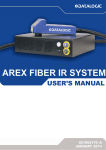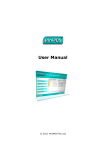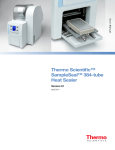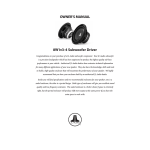Download Operating Instructions Biological Safety Cabinet MSC
Transcript
Operating Instructions Biological Safety Cabinet MSC-Advantage™ Valid: Valid: 04.2011 / 50128856 Operating Instructions Biological Safety Cabinet | MSC-Advantage Inhaltsverzeichnis Copyright 2011 These operating instructions are protected by copyright. Rights resulting thereof, particularly reprint, photomechanical or digital postprocessing or reproduction, even in part, are only allowed with the written consent of Thermo Electron LED GmbH. This regulation does not apply to reproductions for in-plant use. Trademarks MSC Advantage and SmartFlow are registered trademarks of Thermo Scientific. Thermo Scientific is a brand of Thermo Fisher Scientific Inc. All other trademarks mentioned in the operating instructions are the exclusive property of the respective manufacturers. Thermo Electron LED GmbH Robert-Bosch-Straße 1 D - 63505 Langenselbold Germany The Thermo Electron LED GmbH is a subsidiary from: 50128856_04.2011 Thermo Fisher Scientific Inc. 81 Wyman Street Waltham, MA 02454 USA 2 Operating Instructions Biological Safety Cabinet | MSC-Advantage Contents 1 General notes ......................................................................................... 6 1.1 Instruction of the operating personnel ........................................... 6 1.2 Applicability of the instructions ...................................................... 7 1.3 Warranty ......................................................................................... 7 1.4 Explanation of symbols .................................................................. 8 1.4.1 Symbols used in the operating instructions .............................. 8 1.4.2 Symbols on the device ............................................................. 9 1.5 Use of the device ......................................................................... 10 1.5.1 Correct use ............................................................................. 10 1.5.2 Incorrect use ........................................................................... 10 1.6 Standards and safety regulations ................................................ 11 2 Delivery ................................................................................................. 12 2.1 Standard components .................................................................. 12 2.2 Acceptance inspection ................................................................. 12 2.3 Transport security lock and device packaging ............................ 12 3 Installation ............................................................................................ 13 3.1 Ambient conditions ...................................................................... 13 3.2 Room ventilation .......................................................................... 14 3.3 Correct location ............................................................................ 14 3.4 Installation in series ..................................................................... 14 3.5 Transport ...................................................................................... 15 4 Description of the device .................................................................... 16 4.1 Overall view ................................................................................. 16 4.2 Safety system .............................................................................. 18 4.3 Filter system ................................................................................. 19 4.4 Operating and display elements .................................................. 20 4.5 Sample chamber access ............................................................. 21 4.6 Device interfaces ......................................................................... 22 4.7 Sample chamber illumination ...................................................... 24 4.8 UV lamp unit ................................................................................ 24 4.9 Working area ................................................................................ 24 50128856_04.2011 5 Start-up .................................................................................................. 25 5.1 Initial operation ............................................................................. 25 5.2 Installing the device and accessories .......................................... 25 5.3 Unlocking the transport protection ............................................... 26 5.4 Levelling the cabinet .................................................................... 26 5.5 Power supply connection ............................................................. 27 5.6 Installation test ............................................................................. 29 6 Handling and control ........................................................................... 30 6.1 Operating panel ........................................................................... 30 6.1.1 Functional units ....................................................................... 30 6.1.2 Display during calibration routine ........................................... 31 6.1.3 Display during UV disinfection ................................................ 31 6.1.4 Failure messages ................................................................... 32 6.2 Device start-up ............................................................................. 32 6.3 Description of the operating modes ............................................. 33 7 Operation .............................................................................................. 35 7.1 Hygiene preparations for the sample chamber ........................... 35 7.2 Loading the sample chamber ...................................................... 35 7.3 Response to failure messages .................................................... 35 7.4 Work rules .................................................................................... 36 3 Operating Instructions Biological Safety Cabinet | MSC-Advantage Contents 8 Shut-down ............................................................................................. 37 8.1 Interrupting an operation ............................................................... 37 8.2 Shutting the device down .............................................................. 37 9 Cleaning and decontamination .......................................................... 38 9.1 Decontamination procedure .......................................................... 38 9.2 Wipe/spray disinfection ................................................................ 38 9.3 UV disinfection after a wipe/spray disinfection ............................. 40 9.3.1 UV disinfection using the integral UV lamp ............................. 40 9.3.2 UV disinfection using a mobile UV device (optional) ............... 40 9.3.3 Changing UV disinfection time ................................................ 40 9.4 Disinfection with formaldehyde ..................................................... 41 9.5 Cleaning the exterior surfaces ...................................................... 41 9.6 Cleaning the front window ............................................................. 41 9.7 Cleaning the floorpan .................................................................... 42 9.8 Cleaning the protective grid .......................................................... 42 10 Maintenance ......................................................................................... 43 10.1 Inspection ..................................................................................... 43 10.2 Service .......................................................................................... 43 10.2.1 Sample chamber illumination .................................................. 44 10.2.2 Optional UV lamps .................................................................. 44 10.3 Retrofitting and repairs ............................................................... 44 10.4 Exchanging SmartPorts ................................................................ 45 11 Disposal ................................................................................................. 46 11.1 Disposal procedure ...................................................................... 46 12 Technical data ...................................................................................... 48 13 Device log ............................................................................................. 52 14 Certificate of decontamination ........................................................... 53 Fig. Fig. Fig. Fig. Fig. Fig. Fig. Fig. Fig. Fig. Fig. Fig. Fig. Fig. Fig. Fig. Fig. 4 1 2 3 4 5 6 7 8 9 10 11 12 13 14 15 16 17 Device arrangement in the operating room ..................... 14 Lift points ........................................................................ 15 Overall view ..................................................................... 17 Filter system with downflow and exhaust air filter .......... 19 Operating and display elements ..................................... 20 Sample chamber opening ............................................... 21 Supply interfaces ............................................................ 22 UV lamp unit .................................................................. 24 Working area on the workplate, armrests ....................... 24 Stand installation ............................................................ 25 Unlocking the transport protection ................................. 26 Operating panel I ............................................................ 30 Operating panel II ........................................................... 31 Display upon start-up ..................................................... 32 Sitting posture ................................................................ 36 Protective grid segment .................................................. 42 UV lamp replacement ..................................................... 44 50128856_04.2011 Figures Operating Instructions Biological Safety Cabinet | MSC-Advantage 1 General notes The following are the addresses of the international Thermo FisherScientific Sales Organisations. Postal address Germany Thermo Electron LED GmbH Robert-Bosch-Straße 1 D - 63505 Langenselbold Inquiries from Germany Phone Phone Sales 0800 1 536376 Phone Service 0800 1 112110 Fax Sales/Service 0800 1 112114 EMail [email protected] Enquiries from Europe, Middle East and Africa Phone + 49 (0) 6184 / 90-6940 Fax + 49 (0) 6184 / 90-6772 EMail [email protected] Postal address USA Thermo Fisher Scientific 275 Aiken Road Asheville, NC 28804 USA Enquiries from North America Phone +1 800-879 7767 Fax +1 828-658 0363 EMail [email protected] Enquiries from Latin America Phone +1 828-658 2711 Fax +1 828-645 9466 EMail [email protected] 50128856_04.2011 Enquiries from Asia Pacific Phone +852-2711 3910 Fax +852-2711 3858 EMail [email protected] 5 Operating Instructions Biological Safety Cabinet | MSC-Advantage 1 General notes 1.1 Data of the MSC-Advantage and the documentation Device identification Device Name: Biological Safety Cabinet Model: MSC-Advantage ™ Model lines: 0.9, 1.2, 1.5, 1.8 Model 1.2.from serial devices: 41070608 Model 1.8.from serial devices: 41070639 Assignment of the product documentation User manual: 501268856 Availability: 04.2011 Certification and Quality Audit: Conformity: CE conformity marking 1.2 Instruction of the operating personnel These operating instructions describe the biological safety cabinet • MSC Advantage and apply to the models MSC 0.9, 1.2, 1.5, 1.8. The biological safety cabinet has been manufactured in keeping with the latest technological developments and has been tested before delivery for its correct function. It may, however, present potential hazards if it is not used according to the intended purpose or outside of operating parameters. Therefore, the following procedures must always be observed to prevent accidents: • The biological safety cabinet must be operated only by trained and authorized personnel. • For any operation of this device, the operator must prepare clear and concise written instructions in the language of the operating and cleaning personnel based on these operating instructions, applicable safety data sheets, plant hygiene guidelines, and technical regulations, in particular: • which decontamination measures are to be applied for the cabinet and accessories, • which protective measures apply while specific agents are used, • which measures are to be taken in the case of an accident. • Repairs to the device must be carried out only by trained and authorized expert personnel. • • • • 6 Applicability of the instructions The contents of the operating instructions are subject to change without further notice. Concerning translations into foreign languages, the German version of these operating instructions is binding. Keep these operating instructions close to the device so that safety instructions and important information are always accessible. Should you encounter problems that are not detailed adequately in these operating instructions, please contact Thermo Fisher Scientific immediately for your own safety. 50128856_04.2011 1.3 Operating Instructions Biological Safety Cabinet | MSC-Advantage 1 General notes 1.4 Warranty Thermo Fisher Scientific warrants the operational safety and functions of the biological safety cabinet only under the condition that: • the device is operated and serviced exclusively in accordance with its intended purpose and as described in these operating instructions, • the device is not modified, • only original spare parts and accessories that have been approved by Thermo Fisher Scientific are used, • inspections and maintenance are performed at the specified intervals, • an installation test is performed prior to the initial operation of the device and that a repeat test is performed on the occasion of all inspections and repairs. The warranty is valid from the date of delivery of the device to the operator. 1.5 Standards and safety regulations The device complies with the safety requirements of the following standards and directives: • • • • • • • • EN 12469 NF 095 Rev3.2006 / NF - Postes de Sécurité Microbiologique IEC 61010-1 EN 61010-1 EN 12469 DIN EN 61326-1 Low Voltage Directive 2006/95 EG EMC Directive 2004/108 EG 50128856_04.2011 For the setting-up and installation of the biological safety cabinet the respective national regulations must be observed. 7 Operating Instructions Biological Safety Cabinet | MSC-Advantage 1 General notes 1.6 Explanation of symbols 1.6.1 Symbols used in the operating instructions WARNING! is used if non-observance may cause serious or even lethal injuries. CAUTION! is used if non-observance may cause medium to minor injuries or damage. NOTE! is used for hints and useful information. RECYCLING! Valuable raw materials can be reused. 50128856_04.2011 Warning against electric shock. 8 Operating Instructions Biological Safety Cabinet | MSC-Advantage 1 General notes 1.6.2 Symbols on the device Observe operating instructions (switchbox ceiling) Warning against hand injuries (device side walls) Biohazard (left front section of device) CE Conformity declaration Checked safety (cover light dome) Norme Française / NF - Postes de Sécurité Microbiologique 2 x T 5A T5A note (sample chamber fusing) RS 232 interface (top side of plenum panel) 50128856_04.2011 Installion of the armrests (right side of the light hood) 9 Operating Instructions Biological Safety Cabinet | MSC-Advantage 1 General notes 1.7 Use of the device 1.7.1 Correct use The Biological Safety Cabinet is a laboratory device for installation and operation in microbiological and biotechnical laboratories of safety levels 1, 2, and 3. It has been designed as a Class II microbiological biological safety cabinet, in accordance with EN 12469. Depending on the hazard level of the agents involved, the operator must prepare in writing appropriate decontamination procedures for the device and the accessories used in the sample chamber. Prior to the initial operation of the cabinet, the operator must perform an installation test. The test result must be documented by a test report. The cabinet must only be released for operation if it is in compliance with the operating parameters specified by Thermo Fisher Scientific. After any changes to the installation conditions and after any modification to the technical system, a repeat test must be performed and the test result must be documented by a test report that shows that all operating parameters are in compliance with those specified by Thermo Fisher Scientific. 1.7.2 Incorrect use The biological safety cabinet must not be used in laboratories that do not comply with the requirements of safety levels 1, 2 or 3. The device must not be operated as a Class II biological safety cabinet if: • no repeat test is performed after changes to the installation conditions or after modifications to the technical system, • the alarm system of the device has issued a failure message and the cause for the failure has not been repaired. The alarm system must not be tampered with or disabled. If alarm system components heve been removed or disabled for service or repairs, the device must only be released for operation if all alarm system components are functioning properly again. 50128856_04.2011 The filters installed in the device are not capable of separating gaseous substances. Therefore, never store or process gases or gas-releasing substances in the device: • which in quantity or concentration are toxic, • if a reaction with other substances may result in hazardous toxic concentrations or formation of toxic gases, • that may form combustible or explosive mixtures in combination with air. 10 Operating Instructions Biological Safety Cabinet | MSC-Advantage 2 Delivery 2.1 Scope of delivery Delivery for the biological safety cabinet includes the following: • biological safety cabinet (without stand) • armrests • device documentation: – operating instructions – factory test report Optional components and accessories are listed as separate items in the delivery document. 2.2 Acceptance inspection After the device has been delivered, immediately check the device: • for completeness, • for possible damage. If the delivery is incomplete or if you detect any transport damage to the device, contact the forwarding agency and Thermo Fisher Scientific immediately. 2.3 Transport security lock and device packaging 50128856_04.2011 A transport security lock protects the device counterweight during transport. Protective packagings protect the floorpan, the front window, and the workplate segments. To remove the transport security lock and the protective packagings, please refer to the enclosed installation instructions and to Sections 5.2 and 5.3 of these instructions. 11 Operating Instructions Biological Safety Cabinet | MSC-Advantage 3 Installation 3.1 Ambient conditions The operational safety and correct function of the device depends on the location where it is to be operated. The biological safety cabinet must be operated only at locations that meet the ambient conditions listed below. Location requirements: • The electrical system of the device has been designed for an operating height of up to 2000 m above sea level. • The mains power supply outlet should be out of casual reach to prevent accidental shut-off. Ideally, the outlet should be installed above the safety cabinet. The outlet must be accessible to authorized personnel only. It constitutes, together with the power cable plug, the disconnection device for all poles. • The flooring of the location must be adequately strong and not flammable. • The stand must ensure a sufficient load-bearing capacity (twice the device weight). • The room in which the device is installed must be of adequate height. For devices that are not connected to an exhaust system, the distance between the exhaust air opening at the device ceiling and the room ceiling must be at least 200 mm (8 in). • The location must be equipped with an appropriate ventilation system (see Section 3.2.). • For the valves may be installed a lateral distance of at least 300 mm is required to ensure accessibility for the installation, see Chapter 4.6 • The temperature within the room must be between 15 °C and 40 °C (49 °F and 104 °F). • The relative humidity in the vicinity of the device must not exceed 90 %. NOTE - Ambient conditions! If ambient conditions vary from those described above, please contact Thermo Fisher Scientific for assistance in installing the device. NOTE - Temporary storage! 50128856_04.2011 If the device is stored only temporarily (up to four weeks), the ambient temperature may be between -20 °C and +60 °C (-4 °F and +140 °F) at a relative air humidity of up to 90 %. For longer storage periods, the location requirements apply. 12 Operating Instructions Biological Safety Cabinet | MSC-Advantage 3 Installation 3.2 Room ventilation The room ventilation should preferably be a ventilation system that complies with the national requirements for the application. • The inlet air and exhaust air openings of the room ventilation must be located so that drafts are prevented from impairing the function of the safety cabinet air system. Coupling to laboratory exhaust systems Coupling biological safety cabinets to a laboratory exhaust system, air that spills of biological agents must be discharged to prevent inflow to the installation space. The ventilation system of the biological safety cabinet itself are not to be influenced. If a coupling to a laboratory exhaust system is installed, it must be ensured that no harmful air flow is created in the installation space. The volume of air discharged by the exhaust system must be tracked accordingly into the installation space. It should be noted, that the equipment air flow itself is not affected. The on site exhaust system should be dimensioned, so the air velocity scale in the draft interruptor and exhaust air plenum is sufficient, that the equipment exhaust air has no air resistance. In states, where the coupling to a laboratory exhaust system is regulated by further provisions, the relevant national regulations must be observed. CAUTION – Installation test! 50128856_04.2011 During the initial start-up of the biological safety cabinet an initial installation test must be performed. The installation location of the biological safety cabinet with connection to a technical ventilation or with a coupling to laboratory exhaut system and additional installedexhaust accessories are not to be changed. Every modification of the installation location requires a new installation test (see chapter 5.6)! 13 Operating Instructions Biological Safety Cabinet | MSC-Advantage 3 Installation 3.3 Correct location 1 2 3 Choose a draft-free location where the biological safety cabinet does not interfere with the plant traffic. Fig. 1: This figure shows preferred locations for biological safety cabinets and unsuitable locations that are not in accordance with the safety requirements. Unsuitable locations: The locations [1], [2], and [3] are not suitable because they are exposed to drafts from windows and doors. Location [5] is unsuitable because it is within range of plant traffic and within the exhaust air range of a ventilation system [4]. Preferred locations: The locations [6], [7], and [8] are correct because they are in a draft-free section of the room and not exposed to plant traffic. A counterweight at the device backpanel moves synchronously with the vertical movement of the front window. To prevent the counterweight from jamming, the device backpanel should be as close to the wall as possible. 3.4 Installation in series When several devices are to be installed in series, please observe the following: • 5 8 7 6 Fig. 1 Device arrangement in the operating room 50128856_04.2011 • Make sure that vibrations cannot be transferred between adjacent devices. Exterior surfaces of the cabinets must always be accessible for cleaning and disinfection. 4 14 Operating Instructions Biological Safety Cabinet | MSC-Advantage 3 Installation 3.5 Transport Fig. 2: To prevent tilting, always transport the device using a suitable carrier, even for a transport within a building, and separate it from the stand (see Section 5.2). CAUTION – Tilting danger! If the unit is tilted too much during lifting, risk of tipping exists. Lift the biological safety cabinet only vertically! For transportation (including inside buildings) use an appropriate lifting device, which ensures that the unit: • is on a stable stand and • is secured against lateral tilting. Do not transport the biological safety cabinet on a base with roles. CAUTION – Lift points! Fig. 2 Lift points For transport, lift the device only at the lift points shown in Figure 2. Do not allow the weight of the cabinet to rest on the floorpan! CAUTION – Crushing hazard! The weight of the front window is counterbalanced by the counterweight (at the rear of the device). The device must not be transported unless the counterweight has been locked. • Install the four lockscrews (see Section 5.3). 15 Operating Instructions Biological Safety Cabinet | MSC-Advantage 4 Description of the device 4.1 • • • • • • • • • • Overall view Fig. 3: Plenum assembly [3] with plenum for downflow blower [19] and plenum for exhaust air blower [20]. The downflow filter and the exhaust air filter are installed immediately to the pertaining plenum. The exhaust air is discharged to the exterior of the device through an opening. The plenum assembly is concealed behind a cover [18]. Switchbox [2] with power supply unit and power supply cable [1]. The top of the device contains an RS 232 connection [23] for a PC and two fuse holders [22]. Light dome [4] for the sample chamber illumination unit, equipped with one fluorescent tube (model MSC 1.2) or two fluorescent tubes (model MSC 0.9, 1.5, 1.8). The optional, device-integral UV lamp is installed to the ceiling at the front section of the sample chamber. Operating panel [5] with function keys and indicators. Front window [7] with two handles [6]. Bushings [8] and [9] in the side panels (3 on each side). The bushings [9] can be used to install media valves [11], the bushings [8] of type SmartPort are provided for laying cables or hoses into the utility chamber. Stand [10] (optional). Workplate segments [13] with 2 armrests [14]. A one-piece workplate and special workplates are available as optional accessories. Internal outlets [15] for the power supply of accessories (optionally, one of the outlets can be equipped with an adapter [17] for mobile UV devices). Test hoses for the downflow unit [16] at the left side of the sample chamber and for the exhaust air unit [12] at the right side of the sample chamber. NOTE – Test hoses! 50128856_04.2011 Do not remove the caps of the two test hoses for checking downflow and exhaust air. 16 Operating Instructions Biological Safety Cabinet | MSC-Advantage 4 Description of the device 50128856_04.2011 Fig. 3 Overall view 17 Operating Instructions Biological Safety Cabinet | MSC-Advantage 4 Description of the device 4.2 Safety system The safety system comprises a combination of protective and alarm systems that ensure maximum personal and material protection. Warning system: • Airflow monitoring Airflow monitoring determines the velocity of the airflow in the sample chamber as well as the inflow velocity of the air aspired from the exterior through the working opening. As soon as airflow velocities move above or below a specified safety value, a signal is transmitted to the alarm system. • Visual and audible alarm system The warning system constantly monitors the safety-relevant device functions: • Inflow velocity of the air aspired from the exterior, • downflow velocity, • work position of the front window. If the warning system detects changes to one of these device functions, it issues: • an audible and a visual alarm signal. 18 50128856_04.2011 Safety systems: • Vacuum-sealed air system A vacuum-sealed air system in combination with HEPA filters for downflow and exhaust air forms the basis of the safety system for personal and material protection. • Personal protection Air aspired from the exterior along the entire working opening at a constant high velocity prevents: • agents leaking through the working opening of the chamber. As the exterior air pressure around the device exceeds the pressure of the internal air system (vacuum sealing), it ensures: • agents cannot be released to the exterior in the case of a leak in the cabinet housing. • Material protection A steady airflow within the air system ensures: • a constant downflow allowing the HEPA filters to remove contaminants so that the samples are always surrounded by ultrapure air, • harmful particles are not carried over through the sample chamber (protection from cross-contamination). • HEPA filters The downflow (i.e. the air circulating within the device) and the exhaust air (air that is released to the exterior) are cleaned by HEPA filters (HEPA = High Efficiency Particulate Air Filter). • Safety lockout To protect from UV radiation, the optional UV disinfection routine can be run only if the front opening is closed. During UV disinfection, the front opening safety lockout is activated and prevents harmful UV radiation from being emitted from the sample chamber. Circuits can be driven via potential-free contacts (monitor contacts), e.g. a solenoid that switches automatically upon cancellation of the work mode. Operating Instructions Biological Safety Cabinet | MSC-Advantage 4 Description of the device • • Position monitoring The position sensors detect the opening state of the front window and indicate whether the window is open or closed in the work position. SmartFlow Indicatordisplay The SmartFlow Indicator displays the compensation capabillity of the exhaust control, if the window is in working position and blower on. 4.3 Filter system Fig. 4: The filter system consists of two HEPA filters [5] and [2] for the device downflow and exhaust air. HEPA filters: Room air [10] is drawn into the sample chamber through the working opening. In the air duct, room air and the downflow within the chamber [7] are then blended to make up the blend air [8]. The blend air is then: • filtered proportionally by the downflow filter [5] and supplied as ultrapure air [6] evenly into the sample chamber of the device, • filtered by the exhaust air filter [2] and released as ultrapure air [1] to the exterior of the device. Inlet air protection: Multi-segment protective grids [9] are installed below the work surface in the air duct between sample chamber and device plenum. The grids prevent coarse particles from entering the plenum where they might impair the function of the blowers [3] [4] and of the filters [2] [5]. The grids can be removed for cleaning. Fig. 4 Filter system with downflow and exhaust air filter 19 Operating Instructions Biological Safety Cabinet | MSC-Advantage 4 Description of the device 4.4 Operating and display elements Fig. 5: The biological safety cabinet is operated using an operating panel consisting of keys, function indicators and a display. [A] The display with its 5-digit indicator panel shows the following information, regardless of the activated operating function: – normal operation: operating hours of the device, – safe work mode: downflow and exhaust air velocities, – calibration routine: status of the calibration function, – device-controlled UV disinfection (optional): remaining disinfection time. Values are output as integers. [B] Keys for switching operational functions on or off, [C] Status indicators show the operational status of: – front window work position, – airflow, – reduced blower speed, – SmartFlow Indicator 50128856_04.2011 Fig. 5 Operating and display elements 20 Operating Instructions Biological Safety Cabinet | MSC-Advantage 4 Description of the device 4.5 Sample chamber access Fig. 6: The manually movable front window [1] made of multilayer security glass seals the safety sample chamber front side up. The sample chamber is accessible through various positions of the front window. For operation: • Work position with opening height A for access to the sample chamber during the work process, • maximal opening height B for loading the sample chamber, • position C (closed state): closed front window and reduced blower speed. NOTE – Status indicator! The two positions A and C are determined by switches and output as status indicators on the display (see Section 6.1.1). For cleaning / maintenance: • SmartClean window cleaning position with opening height D for cleaning and disinfecting the upper section of the front window. For this purpose, the front window can be lowered beyond closed position C so that a sufficiently high gap exists between the sample chamber ceiling and the front window upper edge. This gap can be also used for replacing the sample chamber illumination lamps. Fig. 6 Sample chamber opening CAUTION – Front window jamming! Do not use force to move the front window. If the window is jammed or sluggish, contact Technical Service immediately. Do not attempt to repair this problem! 21 Operating Instructions Biological Safety Cabinet | MSC-Advantage 4 Description of the device 4.6 Device interfaces Fig. 7 Supply interfaces 22 50128856_04.2011 Fig. 7: The standard equipment includes: • outlets for internal/external power supply, • bushings on both sides for cables, media valves, and hoses, • a communication port, • a connection to external alarm systems. Power supply connection: The connection to the power supply system is established via a cable with grounding plug [4] at the upper side of the device. Device-integral power supply: The backpanel contains outlets [10] for the power supply (overall maximal current: 5 A) of internal accessories. • 2 outlets (model MSC 0.9, 1.2) • 4 outlets (model MSC 1.5, 1.8) Optionally, an outlet can be replaced with a disinfection adapter [9] for the connection of a mobile UV device. Two fuse holders for 5 A miniature fuses at the top of the front cover protect the device-integral power supply: [1] for (L), [2] for (N). Communication port: The top of the device side contains an RS232 connection [3] for a PC. Bushings: The standard fittings are 3 bushings per side panel. SmartPort [6] is provided to lead through cables or hoses for accessories required in the utility chamber. To this end, the rubber grommet [5] is punched out in the exact opening size to avoid possible contamination. Media valves [8] are installed solely in the bushings [7]. Media valves suitable for installing in bushings can be supplied as an option. Upon delivery of the device, the bushings are sealed. Operating Instructions Biological Safety Cabinet | MSC-Advantage 4 Description of the device CAUTION – Unstable underpressure! Do not switch the unit off as long as cables/ hoses are laid through the bushings. If breached bushings are not used in operation, new covers must be inserted in the openings to ensure stable underpressure in the utility chamber (see Chap. 10.4). CAUTION – Combustible gas! If a gas burner is to be operated in the sample chamber, an appropriate shut-off device for the gas supply system (shut-off valve, solenoid valve) must be installed. To ensure a safe distance to the recirculation filter the laboratory safety burner are to be placed at the working surface and not at an elevated position. Use only laboratory safety burners in the sample chamber. Potential equalization: To avoid static charges and the associated risks, if necessary, intended supply connections and the device itself should be integrated in the on-site potential equalization. For this purpose, the potential equalization connection on the stand can be used. The installation of utility connections to the built-in fittings must be made with consideration to the current national technical rules. External alarm systems: This alarm contact can be used for two different external alarm systems: • Potential-free contact (valve) for driving external exhaust air systems (technical ventilation), • Potential-free contact (monitor alarm) for the connection to an external alarm system (failure reporting system) or gas supply solenoids. 50128856_04.2011 CAUTION – High voltage! The contact with live parts may result to a lethal electrical shock. During work on electrical equipment shut of the device and all poles disconnected. Repairs to the device must be carried out only by trained and authorized expert personnel. 23 Operating Instructions Biological Safety Cabinet | MSC-Advantage 4 Description of the device 4.7 Sample chamber illumination Fig. 8: The sample chamber illumination unit [2]: • one flourescent tube for model MSC 1.2, • two flourescent tubes for model MSC 0.9, 1.5,1.8, is installed behind the light dome [3]. 4.8 UV lamp unit Fig. 8: The optional, device-integral UV lamp [1] is installed to the ceiling at the front section of the sample chamber. The operating time of the UV lamp is preset. The UV disinfection routine can be started by depressing a key on the operating panel. NOTE – Protection from UV radiation! To protect from UV radiation, the UV lamp can be activated only when the front window is completely closed. When the front window is opened, the UV disinfection routine is cancelled immediately. 4.9 Working area The standard equipment comprises the segmented workplate. The workplate segments are placed onto the frame above the sample chamber floorpan. Fig.8 UV lamp unit NOTE – Workplate condition Use properly plane lying workplates only. Replace deformed workplates. Pay attention to the maximum work load (see sction 12)!. Fig. 9: The working area A for optimal product protection extends over the entire width B and depth C of the workplate [1]. The two armrests [3] are positioned centrically to the working area at distance D (20 cm) from each other. For attachment, each armrest is inserted into the first perforation track [2] of the workplate. Safe working in the work mode of the device (see section 6.3) is ensured only if the armrests are used correctly! 24 Fig.9 Working area on the workplate, armrests 50128856_04.2011 NOTE – Using the armrests Operating Instructions Biological Safety Cabinet | MSC-Advantage 5 Start-up 5.1 Initial operation Prior to the initial operation, the biological safety cabinet must be subjected to an installation test. Correct assembly and installation performed by the operator are essential for good start-up. Upon the initial connection to the power supply system, the device control starts an automatic calibration routine to determine the parameters for the safety system of the device. NOTE – Calibration routine! The calibration routine is no substitite for the installation check performed by the service personnel. 5.2 Installing the device and accessories Device without stand: • Place the device without stand onto a sufficiently stable substructure so that the weight of the device frame does not rest upon the floorpan. • Remove the protective foil from the floorpan. Device with stand: Assemble the stand (accessory) and install the device frame onto the stand: 1. Fig. 10: Slide the two crossmembers [2] onto the retaining angles [3] of the side panels [1], then secure the crossmembers to the side panels using the screws with wedge lock washers [4]. 2. To install the device frame [5] to the stand [7], insert four Allen screws with wedge lock washers [6] loosely into the threaded holes at the bottom of the device. 3. Place the biological safety cabinet onto the stand so that the Allen screws with wedge lock washers [6] are routed through the holes [8] of the retaining tabs [10]. 4. Slide the device frame [5] into the retaining tab grooves [9] all the way to the stop. 5. Tighten the four Allen screws with wedge lock washers [6]. Fig. 10 Stand installation 25 Operating Instructions Biological Safety Cabinet | MSC-Advantage 5 Start-up 5.3 Unlocking the transport protection Fig. 11: The front window counterweight [1] is secured to the device backpanel to protect it from transport damage. CAUTION – Unlocking the counterweight! The counterweight at the device backpanel compensates for the weight of the front window. The front window must not be moved unless: • the counterweight has been unlocked so that it can move freely, • the protective packaging has been removed from the front window, • the device frame has been installed safely on a sufficiently stable substructure or onto a stand. Crushing hazard - after unlocking, keep hands and fingers away from the motion range of the counterweight! To unlock the transport protection: • Remove the four retaining screws (position: see arrows). • Keep the counterweight retaining screws for later transports. 5.4 Levelling the cabinet The cabinet should be levelled only after it has been positioned. 1. Remove transport protection (vinyl) from the workplate or from the workplate. 2. Place the workplate onto the front and rear support rails in the sample chamber with the wide perforated track facing the front window. 3. Devices without stand: Place a bubble level onto the workplate (segments) and align the stand until the level indicates an absolutely horizontal position in all directions. 4. Devices with optional stand: Place a bubble level onto the workplate and adjust the four stands until the level indicates an absolutely hotizontal position in all directions. Proceed the elevating adjustment from right to left and from rear to front. 26 Fig. 11 Unlocking the transport protection Operating Instructions Biological Safety Cabinet | MSC-Advantage 5 Start-up 5.5 Power supply connection WARNING – High voltage! Contact with current-carrying components may cause a lethal electric shock. Before connecting the device to the power supply system, check plug and power supply cable for possible damage. Do not use damaged components to connect the device to the power supply system! Establishing the power supply connection: 1. Before connecting the device to the power supply system, check to see if the voltage of the outlet corresponds with the specifications on the nameplate of the device. If the ratings given for voltage (V) and maximum current (A) do not match, the device must not be connected to the power supply system. 2. Connect the grounding plug of the device to a properly grounded and fused outlet. • The outlet must be fused separately using a fusible link T 16 A or using a circuit breaker B 16. 3. Make sure that the power cable is routed away from the counterweight and cable guide. For this purpose, the power cable can be secured to the device ceiling using the enclosed adhesive bases and cable ties (see installation instructions). 4. Make sure that the power supply line is not subjected to tensile or compressive force. Installation of the power supply connection: To protect from accidental switch-off, the power supply outlets should be located out of casual reach und must be accessible only to authorized persons. Ideally, the outlet should be located above the biological safety cabinet. The power supply cable plug is the interruption device in all poles. Connecting the equipotential bonding: If the device sample chamber is supplied with media (gas, water, etc.), the onsite equipotential bonding must be connected to the main ground of the device (see service instructions). 50128856_04.2011 Initialization routine: Upon connection to the power supply system, the device control passes through an initialization routine and switches the device to OFF mode (the right indicator segment of the display shows a dot to indicate that voltage is present). The biological safety cabinet is now ready for operation and can be operated using the keys. Initial start-up: After the initialization routine, the calibration routine is started after the first connection to the power supply system: • The display alternatingly shows "CAL" and the remaining routine time. The entire calibration run takes approximately 30 minutes. 27 Operating Instructions Biological Safety Cabinet | MSC-Advantage 5 Start-up • • The routine starts automatically when the front window is in the work position and if the air flows freely and steadily. If the airflow is disturbed during this run time, the process is cancelled and the calibration routine is restarted. To complete the routine, the determined parameters for safe operation and the alarm limits are stored automatically. NOTE – Initial operation! 50128856_04.2011 According to applicable national standards and regulations, the calibration routine is no substitute for a start-up performed by an authorized service technician. 28 Operating Instructions Biological Safety Cabinet | MSC-Advantage 5 Start-up 5.6 Installation test Do not operate the device before an initial operation with installation test has been performed after the final installation of the device. • The installation test must be performed in accordance with the specifications of EN 12469 / 2000. The cabinet may be operated as a Class II microbiological biological safety cabinet, in accordance with EN 12469 / 2000, if the device functions or function patterns listed below were checked and if the test results are within the safety value tolerances specified by the manufacturer in Annex F: • Electrical safety test • Inflow velocity test • Downflow velocity test • HEPA filter leakage test • Airflow control test • A repeat test must also be performed after repairs to the device or after considerable changes (more than 5 cm) to the location of the device. • The operator must prepare a test report or request a written test report from the authorized test service. NOTE – Safety warranty! The operational safety of the device, particularly the personal and material protection, are guaranteed only if all safety functions of the device have been tested and approved. Thermo Fisher Scientific will not warrant the operational safety if the device is operated without performance of the required installation test or if the installation test and repeat test are not performed by adequately trained and authorized personnel! NOTE – Device hygiene! 50128856_04.2011 The initial operation with subsequent installation test does not include any decontamination measures. For operation in the work process, the sample chamber of the device and the accessories required for the work process must be disinfected and cleaned in accordance with the hygiene guidelines set forth for the application. 29 Operating Instructions Biological Safety Cabinet | MSC-Advantage 6 Handling and control 6.1 Operating panel Fig. 12: The operating panel is the major display and operating element and has been divided into three functional units: • Display [1], keys [2] - [7], status indicators [8] - [18] Fig. 12 Operating panel 30 50128856_04.2011 6.1.1 Functional units Display, Fig. 12: [1] Display for numbers and text: • normal operation: operating hours of the device, • safe work mode: downflow and exhaust air velocities, • calibration routine: status of the calibration function, • device-controlled UV disinfection (optional): remaining disinfection time. Keys, Fig.12: The keys are used for enabling / disabling device functions: [2] Key for switching the device on / off (switch-off only in standby mode, see Section 6.3). [3] Operating data key with dual function: • Indicating operating data: Press the key to switch between the data: Operating hours, downflow and exhaust air velocities in the safe work mode. • Enabling (I) / disabling (0) the alarm acknowledge function: In the OFF mode, keep the key depressed for approx 5 second. The display momentarily shows the operating hours, then the switching state: I = alarm acknowledge function enabled 0 = alarm acknowledge function disabled Within the scope of the EU (EN12469:2000), the alarm acknowledge function is disabled upon delivery of the device. [4] Key for switching the sample chamber illumination on and off. [5] Key for switching the power supply of device-integral outlets on and off (the LED indicates that voltage is present). [6] Key for switching UV disinfection on and off (the yellow LED indicates that the UV disinfection routine has been activated; if the optional UV lamp is not installed, this key has no function). [7] Key for acknowledging the audible alarm. Operating Instructions Biological Safety Cabinet | MSC-Advantage 6 Handling and control Status indicators, Fig. 12: [8] The air system is operated at reduced capacity (the yellow LED is illuminated), [9] Airflow is not steady (the red LED is illuminated), [10]Airflow is steady (the green LED is illuminated), [11] Front window is not in work position (the red LED is illuminated), [12]Front window is in work position (the green LED is illuminated). SmartFlow dispaly, Fig. 12: The SmartFlow Indicator displays the compensation capability of the exhaust control, with window in working position and blower on. The LEDs that illuminate in pairs indicate the following: [18] green + [17] green sufficient compensation capability [16] yellow + [15] yellow compensation capability is depleted [[14] red + [13] red window outside working position or air velocity outside alarm range NOTE – Compensation capability! If the display is steady yellow-yellow, there is a possibility that the filters of the device are fully loaded. In this case, the technical service should be informed. 6.1.2 Display during calibration routine NOTE – Calibration routine! The calibration routine is started only upon the initial operation. The routine run takes approximately 30 minutes. During this time, the diplay alternatingly shows cal and the remaining time. If the calibration routine cannot be started due to failures, the display shows cal permanently. 50128856_04.2011 6.1.3 Display during UV disinfection If a UV lamp is installed, the diplay alternatingly shows dIS and the remaining disinfection time. 31 Operating Instructions Biological Safety Cabinet | MSC-Advantage 6 Handling and control 6.1.4 Failure messages Failure messages are shown on the display as text/number combinations with the codes ER 3 to ER 7. If one of these codes appears on the display, contact Technical Service immediately. 6.2 Device start-up 1. Fig. 14: Switch the device on, keep the ON key [2] depressed until: • the blowers start (audible blower operation), • the status indicators (LEDs) [9] - [12] illuminate. NOTE – Switch-on! A time delay of several seconds may occur between key actuation and device response. 2. Move the front window to the work position. The correct position is reached when the green status indicator FRONT WINDOW IS IN WORK POSITION [12] is illuminated. The side guide rails have markings that define the lower edge of the front window; these markings can be used as an additional orientation aid. 3. Wait until the green status indicator AIRFLOW IS 4. The device is ready for operation. STEADY [10] is illuminated. 50128856_04.2011 Fig. 14 Display upon start-up 32 Operating Instructions Biological Safety Cabinet | MSC-Advantage 6 Handling and control 6.3 Description of the operating modes The following operating modes exist for the device: • Calibration mode (after initial start-up) • OFF mode • Window open mode • Work mode • Standby mode • UV mode OFF mode: Designates the idle state of the device. • The device is switched off (air system blowers are switched off). • The sample chamber illumination is enabled. • The internal power supply within the sample chamber is enabled: – If the internal power supply is activated, the yellow status indicator INTERNAL POWER SUPPLY ACTIVATED is illuminated. 50128856_04.2011 Window open mode: Designates the state in which the window is open and positioned outside of the work position. To install or remove auxiliaries, the front window can be moved to the maximum opening position. For cleaning, the front window can be lowered (see also Section 4.5 / Fig. 6, P. 21). • The air system blowers are switched on: – The red status indicator AIRFLOW VOLUME STEADY is illuminated. • The front window is not in the work position: – The red status indicator FRONT WINDOW NOT IN WORK POSITION is illuminated. • The sample chamber illumination is enabled. • The internal power supply is enabled: – If the internal power supply is activated, the status indicator INTERNAL POWER SUPPLY ON is illuminated. Work mode: Ensures personal and material protection. In this operating state, the work process is carried out in the sample chamber. Work mode is active when the front window is in the work position and the air system is operating steadily. • The front window is in the work position: – The green status indicator FRONT WINDOW IS IN WORK POSITION is illuminated. The markings on the side guide rails and the lower edge of the front window are at the same height. – No audible alarm signal. • The air system blowers are switched on to ensure steady airflow: – The green status indicator AIRFLOW STEADY is illuminated. • The sample chamber illumination is enabled. • The power supply for the sample chamber outlets is enabled: – If the internal power supply is ON, the yellow status indicator INTERNAL POWER SUPPLY ACTIVATED is illuminated. • The switching state of the potential-free contact (monitor contact) is pass (if e.g. the gas supply solenoid is driven via this contact, gas is supplied in this mode only). • The display can show values for: operating hours, downflow velocity and exhaust air velocity. 33 Operating Instructions Biological Safety Cabinet | MSC-Advantage 6 Handling and control Standby mode: The front window can be lowered to seal the sample chamber. The air system output is reduced to match the lower air requirement. • The front window is closed: – The air system operates at reduced output. – The red status indicator FRONT WINDOW NOT IN WORK POSITON is illuminated. – The yellow status indicator AIRFLOW REDUCED is illuminated. – The red status indicator AIRFLOW NOT STEADY is illuminated. • The sample chamber illumination is enabled. • The internal power supply in the sample chamber is enabled: – If the internal power supply is ON, the yellow status indicator INTERNAL POWER SUPPLY ACTIVATED is illuminated. • The biological safety cabinet can be switched off (in OFF mode): – Keep the ON key depressed until all indicators are off. 50128856_04.2011 UV mode: For running the UV disinfection routine, the front window is completely lowered to protect against UV radiation. The routine cannot be run until the front window is in the "closed" position. • The UV disinfection routine is activated: – The yellow status indicator UV DISINFECTION ROUTINE ACTIVATED is illuminated until the preset time for the routine has elapsed. Then, the UV lamps are switched off automatically, and the status indicator is switched off. • The sample chamber illumination is disabled. • The internal power supply in the sample chamber is disabled. • The integral UV lamp (optional) is enabled. • The power supply for the UV disinfection adapter (optional) is enabled. 34 Operating Instructions Biological Safety Cabinet | MSC-Advantage 7 Operation 7.1 Hygiene preparations for the sample chamber The sample chamber surfaces and the accessories required for the work process must be disinfected and cleaned in accordance with the hygiene guidelines set forth for the application. 7.2 Loading the sample chamber Installing auxiliaries: 1. Move the front window to the maximum opening position and switch the blowers on. 2. Install auxiliaries within the workplate working range. 3. Move the front window to the work position (the green status indicator FRONT WINDOW IN WORK POSITION is illuminated) and wait until the airflow has stabilized (the green status indicator AIRFLOW STEADY is illuminated). CAUTION – Operational safety! The personal and material protection is ensured only if the airflow system of the device is working properly. If the alarm system issues failure messages when the front window is in the work position, stop all applications that may release harmful aerosols! 4. Load the work surface with samples. 5. For work intermissions or for extended experimental phases without manual intervention, switch the device to standby mode. 7.3 Response to failure messages 50128856_04.2011 Failure messages are displayed in form of text/number combinations with a code between ER 3 to ER 7 (see Section 6.1.4). If one of these codes is displayed, contact the Technical Service of Thermo Fisher Scientific immediately. To isolate the cause of the failure, the operating personnel must perform only the following tests and measures: • Check to see if the exhaust air opening on top of the cabinet is blocked. • Ensure that the on-site exhaust air system is activated. • Close doors and windows in the laboratory to prevent drafts. • Switch off devices in the vicinity of the biological safety cabinet that cause air turbulence or emit excessive heat. • Open flames in the sample chamber may impair airflow conditions. 35 Operating Instructions Biological Safety Cabinet | MSC-Advantage 7 Operation 7.4 Work rules The observance of work rules ensures a minimum of operational safety when handling the biological safety cabinet. Before starting an operation: • Take off jewelry. • Put on required personal protective gear, e.g. hand, face, or body protection. • Clean and disinfect sample chamber surfaces at regular intervals. During operation: • Place samples only within the defined work area of the workplate. • Do not place unnecessary items into the sample chamber. • Use only disinfected and cleaned accessories for the work process. • Do not cause air turbulence by quick hand, arm or body movement in the sample chamber or in front of the work opening. • Do not place accessories into the sample chamber that cause air turbulence or emit excessive heat. • Do not block air circulation at the ventilation slots of the workplate. Sitting posture during work: Fig. 15: To prevent risks to health, a height-adjustable working chair with an adjustable seat back should be used during extended work periods at the biological safety cabinet. A When the forearm rests on the armrest, is should be in a nearly horizontal position. B When the upper leg is in a horizontal position, the angle between upper and lower leg should exceed 90°. To ensure a compensation between floor and sitting height, a footrest (DIN 4556) should be used. The minimal effective surface of the footrest should be 45 x 35 cm. C The slope should be adjustable within a range of 5° to 15°. D The adjustable height should extend to a minimum of 11 cm above the floor. After finishing an operation: • Remove samples from the sample chamber and store them properly. • Clean and disinfect the sample chamber surfaces, including the workplate and the floorpan. Clean and disinfect all accessories. 50128856_04.2011 Fig. 15 Sitting posture 36 Operating Instructions Biological Safety Cabinet | MSC-Advantage 8 Shut-down 8.1 Interrupting an operation To interrupt a work process: 1. Remove all samples from the biological safety cabinet and store them properly. 2. Remove accessories from the sample chamber and clean and disinfect them. 3. Clean and disinfect the sample chamber surfaces, the workplate, and the floorpan. 4. Switch the device to standby mode: Close the front window and keep the ON key depressed until the indicators are off (the right indicator segment of the display shows a dot to indicate that voltage is present). NOTE – Blower switch-off! For safety reasons, the blowers can be switched off only when the front window is closed. 8.2 Shutting the device down If the device is not to be used or stored for an extended period of time, it must be completely decontaminated. WARNING – Decontamination measures! To shut the device down, the sample chamber must be disinfected completely and the plenum, including the filters, must be sterilized using formaldehyde. 50128856_04.2011 1. After the device has been decontaminated, close the front window completely. 2. Disconnect the device from the power supply system. 37 Operating Instructions Biological Safety Cabinet | MSC-Advantage 9 Cleaning and decontamination 9.1 Decontamination procedure Several procedures can be applied for decontaminating the biological safety cabinet. Which procedure is selected, depends on: • the potential risk imminent in the agents, • the degree of purity required by an experiment or by a work process. Possible decontamination procedures: Wipe/spray disinfection: is the standard disinfection procedure for cabinets used for microbiological experiments. UV disinfection: is particularly suited as an intensifying additional disinfection after a wipe/spray disinfection. Sterilization with steam: can be used for treating the removable stainless steel components. Examples of autoclavable components are the bezels of the UV lamps, the workplate or workplate segments, the armrests and the protective grid (see Section 9.6 / 9.7). Disinfection with formaldehyde: can be performed if a sterile sample chamber is required for the work process. This sterilization procedure is mandatory: • when filters are replaced, • when the device is shut down, • when the device is discarded. 9.2 Wipe/spray disinfection The wipe/spray disinfection is performed in three stages: • predisinfection, • cleaning, • final disinfection. Recommended disinfectants: Chloride-containing disinfectants may damage some surfaces, Therefore, use only chloridefree disinfectants or a disinfectant with a low enough chloride content to have been proved harmless for stainless steel finishes! Disinfectants with an alcohol content of more than 70 % may cause embrittlement of plastic components after extended exposure. Use only disinfectants with a low alcohol content. When using a disinfectant with an alcohol content of more than 70 %, the release limit of 200 g within 2 hours must not be exceeded. Also suited are disinfectants based on quaternary ammonium compounds. 38 50128856_04.2011 NOTE – Compatibility! Operating Instructions Biological Safety Cabinet | MSC-Advantage 9 Cleaning and decontamination Predisinfection: 1. Remove all samples from the sample chamber and store them properly. 2. Remove accessories from the biological safety cabinet and disinfect them using the disinfection procedure recommended by the manufacturer. 3. The workplate and stainless steel components can be removed from the sample chamber and disinfected separately. 4. For predisinfection, spray disinfectant on all sample chamber surfaces or wipe the surfaces using disinfectant. 5. Do not remove the optional UV lamps from the sockets; wipe them thoroughly using a damp cloth. 6. Switch the device to work mode, move the front window to the work position. 7. Allow disinfectant to react as recommended by the manufacturer, then operate the biological safety cabinet for at least 15 to 20 minutes in the work mode so that released aerosols can be absorbed by the filters. Cleaning: 1. Remove dirt residues and deposits thoroughly using a solution of tepid water and commercially available dishwashing agent. 2. Wipe the surfaces clean using a clean cloth and plenty of clear water. 3. Remove the cleaning liquid from the floorpan and wipe all sample chamber surfaces dry. 50128856_04.2011 Final disinfection: 1. Again, spray disinfectant on all sample chamber surfaces or wipe the surfaces clean using disinfectant. 2. Allow disinfectant to react as recommended by the manufacturer. 39 Operating Instructions Biological Safety Cabinet | MSC-Advantage 9 Cleaning and decontamination 9.3 UV disinfection after a wipe/spray disinfection A UV disinfection can be performed either by using the optional integral UV lamps or by using a mobile UV device. 9.3.1 UV disinfection using the integral UV lamp To start the UV disinfection routine: 1. Close the front window completely, the air system operates in the reduced mode (yellow LED illuminated). 2. Start UV disinfection using the UV key at the operating panel: Keep the UV depressed until the display alternatingly shows dIS and the remaining disinfection time. To interrupt / cancel the UV disinfection routine: 1. Press the UV key (the display shows the operating hours). 2. Slide the front window up. 9.3.2 UV disinfection using a mobile UV device (optional) To control the disinfection routine of a mobile UV device with the biological safety cabinet software, ensure that the connecting plug of the UV device is compatible with the UV disinfection adapter of the biological safety cabinet. To start the UV disinfection routine: 1. Position the mobile UV device centered on the work area and connect it to the UV disinfection adapter. 2. Close the front window completely, the air system operates in the reduced mode (yellow LED illuminated). 3. Start UV disinfection using the UV key at the operating panel: Keep the UV depressed until the display alternatingly shows dIS and the remaining disinfection time. 9.3.3 Changing UV disinfection time The UV disinfection time is preset; this setting can be changed, if required: 1. Switch the cabinet on and move the front window to the work position. 2. Keep the UV key depressed until the preset time is displayed. 3. To increase the time: Press the INTERNAL POWER SUPPLY key. Each pressing of the key increases the time by 30 minutes. 4. To reduce the time: Press the INTEGRAL SAMPLE CHAMBER ILLUMINATION key. Each pressing of the key reduces the time by 30 minutes. 5. To save the values: Press the UV key. The display shows the operating hours again. 40 50128856_04.2011 To interrupt / cancel the UV disinfection routine: 1. Press the UV key (the display shows the operating hours). 2. Slide the front window up. Operating Instructions Biological Safety Cabinet | MSC-Advantage 9 Cleaning and decontamination 9.4 Disinfection with formaldehyde Procedure: For gas disinfection, formaldehyde is evaporated in the tightly sealed sample chamber. The quantity of the formaldehyde used depends on the sample chamber volume of the cabinet version to be disinfected (see Technical Data). Per cubic meter of sample chamber volume, at least 5 g formaldehyde must be evaporated with 20 ml water (corresponds with 25 ml of a 20 % formaldehyde solution). The formaldehyde evaporates immediately when its boiling point is reached. The required reaction time is at least 6 hours. After the required reaction time, the formaldehyde should be neutralized by evaporating a 25 % ammonium solution (10 ml per cubic meter of sample chamber volume). Ambient conditions and accessories: The temperature at the cabinet location should be approx 21 °C, the relative humidity should be between 60 and 85 %. To evaporate the solution, a heating device with a container is required. NOTE – Disinfection procedure! A disinfection with formaldehyde must be performed in accordance with the specifications of EN 12469. As this procedure has considerable risks, it must only be performed by specially trained and authorized service personnel! 9.5 Cleaning the exterior surfaces Wipe the exterior surfaces of the device clean using a solution of TAP water and commercially available dishwashing agent. Then, wipe the exterior surfaces dry using a soft, clean cloth. 9.6 Cleaning the front window 50128856_04.2011 For cleaning (and disinfection using the wipe disinfection procedure), the front window can be lowered beyond the closing position (see Section 4.5). The gap between the light dome and the front window upper edge ensures that the upper section of the window can be cleaned or disinfected. Clean the front window using a commercially available window cleaner. 41 Operating Instructions Biological Safety Cabinet | MSC-Advantage 9 Cleaning and decontamination 9.7 Cleaning the floorpan Clean the floorpan using a solution of tepid water and commercially available dishwashing agent. 1. Remove the workplates from the sample chamber. 2. Remove dirt residues and deposits thoroughly. 3. Wipe the floorpan clean using a clean cloth and plenty of clear water. 4. Remove the cleaning liquid from the floorpan and wipe the floorpan surfaces thoroughly clean. NOTE – Material residues! After cleaning, make sure that all cleaning materials have been removed completely from the floorpan. 5. Reinstall the workplates. 9.8 Cleaning the protective grid Fig. 16: The multi-segment protective grid is retained in the installed position between support surface and airduct wall by its own tension. 1. To remove a grid segment [2], push the retaining tab [1] down until the grid segment can be removed from below the counterholder [3] of the wall. 2. To install the grid segment [2], first place it behind the fixed points [4], then push the retaining tab [1] down and against the counterholder [3] of the wall so that the counterholder engages in the tab. NOTE – Inlet air protection! Do not operate the device without inlet air protection. Prior to any start-up of the device, make sure that the inlet air protection is installed! Fig. 16 Protective grid segment 42 Operating Instructions Biological Safety Cabinet | MSC-Advantage 10 Maintenance 10.1 Inspection The SmartFlow Insicator, the test routine for the biological safety cabinet, determines the cabinet's system status by way of adjusting various device parameters. • An inspection of the device should be performed if the SmartFlow Indicator displays steady 2 yellow LED`s. • Regardless of the SmartFlow Indicator, the biological safety cabinet should be inspected annually. The annual inspection comprises the following checks: • Electrical safety in accordance with national regulations. • Functional test of the device. • Checking all components for possible damage. • Checking the filter state. NOTE – Perforated plate! The perforated plate at the sample chamber ceiling serves as the protection of the downflow filter and prevents refluxing. While scanning the filter surface for a leak test, the perforated plate must be installed. • • Checking the airflow conditions. Repeat test in accordance with EN 12469 / 2000. 10.2 Service HEPA filters: As the filter replacement is an interference with the safety system of the device, filters must only be replaced by Thermo Fisher Scientific or by adequately trained and authorized service personnel. WARNING – Filter replacement! 50128856_04.2011 For any service work in a potentially contaminated section of the biological safety cabinet, a declaration of non-objection by the manufacturer must be presented. 43 Operating Instructions Biological Safety Cabinet | MSC-Advantage 10 Maintenance 10.2.1 Sample chamber illumination Fig. 18: The sample chamber is illuminated by one or two fluorescent tubes (model MSC 0.9, 1.2, 1.5, 1.8). The spring-loaded sockets of the fluorescent tube [2] are installed to the light dome mounting frame in the sample chamber. 1. Switch the device off, disconnect it from the power supply system and protect it against accidental reconnection. 2. Move the front window down all the way beyond the frame (SmartClean position) to ensure a sufficient gap between window upper edge and light dome. 3. The fluorescent tubes are retained by rotatable sockets. Rotate the tube carefully by 90° into the removal position and remove it from the socket. 4. Insert the new tube und rotate it into the contact position. 10.2.2 Optional UV lamps Fig. 17: The optional, device-integral UV lamp [1] is installed to the sample chamber ceiling immediately behind the front window. The UV lamp should be replaced after 1500 operating hours. 1. Switch the device off, disconnect it from the power supply system and protect it against accidental reconnection. 2. Move the front window to the maximum opening position. 3. Wear protective gloves to prevent skin fat residues from burning into the lamp tube. The UV lamp is installed in rotating sockets. To remove, rotate the lamp counter-clockwise to disengage the latch and remove it from the sockets. 4. To install, slide the lamp contact pins into the rotating socket grooves and rotate the lamp clockwise to latch the sockets. 10.3 Retrofitting and repairs External communication systems, e.g. failure report systems or components for supplying media such as gas solenoid valves, can be retrofitted and integrated into the device control. NOTE – Retrofitting and repairs! All retrofitting and repair works are interferences with the safety system of the device. Particularly modifications to the filter system and resulting changes of the airflow may impair personal and material protection. Such work must be carried out only by authorized service personnel. 44 Fig. 17 UV lamp replacement Operating Instructions Biological Safety Cabinet | MSC-Advantage 10 Maintenance 10.4 Exchanging SmartPorts NOTE – Contamination In order to prevent contaminated particles escaping from the utility chamber, the unit must be switched on in order to exchange the SmartPorts. The SmartPorts are removed inwards into the utility chamber. 1. First remove the inner grommet of the SmartPort in the utility chamber inwards from the side panel opening. 2. Then remove the outer grommet of the SmartPort in the utility chamber inwards from the side panel opening. 3. Disinfect both grommets in the utility chamber and take them out of the utility chamber. 4. Insert new outer grommet in the side panel opening from the outside. 5. Insert new inner grommet in the side panel opening from the inside. 45 Operating Instructions Biological Safety Cabinet | MSC-Advantage 11 Disposal 11.1 Disposal procedure Discarded cabinets or device components contain reusable materials. All components with the exception of the HEPA filters can be discarded after having been thoroughly cleaned and disinfected. The HEPA filters must be discarded in accordance with the applicable national and state regulations for special solid waste. CAUTION – Contamination hazard! As the device can be used for processing and treating infectious substances, it may be contaminated. Prior to disposal, the complete device with filters must be decontaminated by performing a formaldehyde sterilization! Recyclable materials! Component Material Printed circuit boards Enclosed electrical components coated with various plastics, mounted on epoxy resin-bound boards. Plastic components, general Note material labeling Exterior housing Steel, painted Device backpanel Stainless steel/steel, painted Front window Multi-layer safety glass Operating panel and indicator foil Polyethylene Stainless steel Armrests Stainless steel Diffusor Aluminium, anodized 50128856_04.2011 Workplates 46 Operating Instructions Biological Safety Cabinet | MSC-Advantage 11 Disposal WEEE Compliance: This product is required to comply with the European Union‘s Waste Electrical & Electronic Equipment (WEEE) Directive 2002/96/EC. It is marked with the following symbol: 50128856_04.2011 Thermo Fisher Scientific has contracted with one or more recycling/disposal companies in each EU Member State, and this product should be discarded or recycled through them. For further information on Thermo Scientific‘s compliance with these Directives, contact the recyclers in your country, and information on Thermo Scientific products wich may assist the detection of substances subject to the RoHS Directive at www.thermo.com/WEEERoHS. 47 Operating Instructions Biological Safety Cabinet | MSC-Advantage Technical data 50128856_04.2011 12 48 Operating Instructions Biological Safety Cabinet | MSC-Advantage 12 Technical data Volume, weights, and loads MSC 0.9 MSC 1.2 Description Volume Unit volume Floorpan MSC 1.5 MSC 1.8 m3 l 1.1 15 1.4 20 1.7 25 2.1 30 kg kg 170 24 200 26 230 28 280 30 Weights Cabinet Stand Loads Max. load per working area module Max. load on overall working area kg 25 kg 50 Ambient conditions MSC 0.9 MSC 1.2 Description Temperature MSC 1.5 Max. ambient temperature during operation °C 40 Min. ambient temperature during operation °C 10 % r.H. % r.H. 90, non-condensing 95 MSC 1.8 Humidity Max. humidity / operation Max. gumidity / storage Heat dissipation to environment Room temperature 20 °C kJ/s 0,15 0,2 0,28 0,34 °K <2 <2 <2 <2 Room temperature rise Above room temperature with window closed Ergonomics 50128856_04.2011 55 Noise level dB(A) 59 The noise level was determined in accordance with EN ISO3744. The sound pressure level was measured at a distance of 1 m in front of the working opening. The measurement uncertainty is within a range of ± 2 dB. 49 Operating Instructions Biological Safety Cabinet | MSC-Advantage 12 Technical data Electrical data MSC 0.9 MSC 1.2 MSC-Advantage Voltage Rated voltage Blower voltage Current Power consumption max. Leakage current IEC1010, EN 61010 Motherboard fusing Outlet fusing On-site fusing Power input max. Protection Protection class Protection type Overvoltage category (IEC 1010, EN 61010) Contamination degree (IEC 1010, EN 61010) A mA A A A W MSC 1.8 1/N/PE AC, 230 V - 50-60 Hz 48 V / DC 7.3 8.7 < 3.5 2 x T 16 A 2xT5A Circuit breaker B16 / Fuse T 16 A Power 1700.0 2000.0 I IP 20 II 2 Cable (3.7 m) 50128856_04.2011 Connecting lines Mains connection V V MSC 1.5 50 Operating Instructions Biological Safety Cabinet | MSC-Advantage 12 Technical data Airflow system MSC 0.9 MSC 1.2 Description Airflows / Airflow velocities Inflow Downflow m/s m/s Air volume Overall volume flow Downflow volume flow Exhaust air volume flow m³/h m³/h m³/h Filters Type Material Separability in MPPS Separability at 0,3 µm particle size MSC 1.5 MSC 1.8 1523 1037 486 1827 1244 583 0.45 0.32 914 622 292 1218 829 389 % HEPA (H 14 according to DIN EN 1822) Glas fiber fleece 99.995 % 99.999 Downflow Width Depth Height mm mm mm 915 Exhaust air Width Depth Height mm mm mm 610 1220 1525 1830 610 915 457 94 610 50128856_04.2011 457 117 51 Operating Instructions Biological Safety Cabinet | MSC-Advantage 13 Device log Part number: Service number: Operator's note: Notes Date Signature 50128856_04.2011 Device type: Serial number: Location: Work carried out 52 Operating Instructions Biological Safety Cabinet | MSC-Advantage Certificate of decontamination 50128856_04.2011 14 53 Internet: http://www.thermofisher.com 54 50128856_04.2011 Operating Instructions Biological Safety Cabinet | MSC-Advantage






















































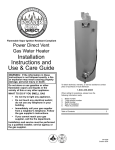
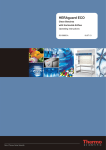
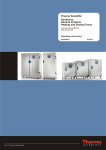
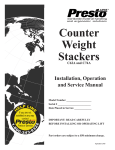

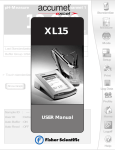
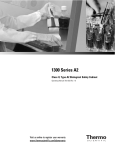
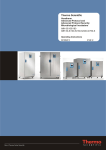
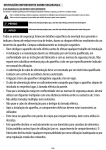
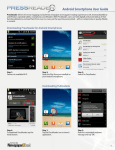
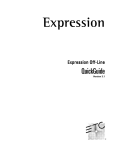
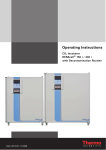
![MSC-Advantage BSC Operating Instructions [IT]](http://vs1.manualzilla.com/store/data/006146994_1-af1ee73797fe896588f37763fa2d0375-150x150.png)
